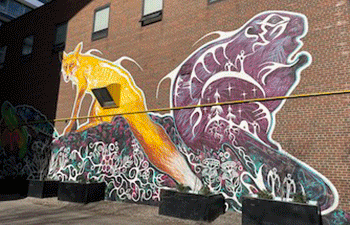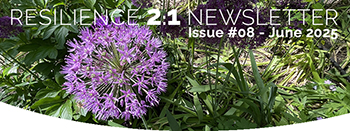Welcome to Resilience 2:1
We are a non-profit,
volunteer driven organization
incorporated federally.
Members represent a diverse
group of disciplines and
interests, all focused on the
issue of resilience for Canada
through a changing climate.
We hope for better practices
and more sustainable ways of
living life and filling our needs.
Take a look, explore the site.
There are lots of resources
available or linked on
the topic of resilience.
.
NEW CONVERSATION POSTS
01. Aleksandar Janicijevic
Less is More: How degrowth will save the world
02. Elaine Bradbee
About Climate Reality
03. Ivan Martinovic
Architecture Climate Change and Society
Resilience is the ability to withstand shocks and move on to live well. With climate change, many now approach diverse sectors of the economy and especially urban and community planning through the lens of resilience. Resilience 2:1 is based on a measure of biocapacity to ecofootprint as tracked for the past 30 years by the Global Footprint Network. There they have data that includes national ecofootprints and resource availability. Canada, has a biocapacity to ecofootprint ratio of roughly 2:1. This is both good news and bad news. The good news is that Canada, due to a low population and large landmass has not overshot its resource base. The bad news is that we used to be much better. The ratio has been declining, especially in the last 30 years.
Resilience demands both mitigation and adaptation to the changes caused by climate disruption. Biocapacity is an essential tool to both mitigate climate change through carbon storage and to enable adaptation through healthier ecosystems.
Trees and soil absorb carbon dioxide. Reforestation and the addition of new trees, also enables habitat that promotes biodiversity and healthier ecosystems. A diverse ecosystem has a better chance of surviving climate change and continuing on in a healthy way.

.
Resilience 2:1 was formed by a group of concerned educators and professionals. We recognize that while many people still talk and teach about sustainability the real issue is resilience. We have gone far enough into climate change that cities, regions, nations and the world must adapt to changing ecosystems.
///////
• Minutes November 28, 2024, Board Meeting
///////
.

Newsletter Issue #08 was published
on June 10, 2025.
You can view it on line=>
_________________________________________
Design & production Omen Design
